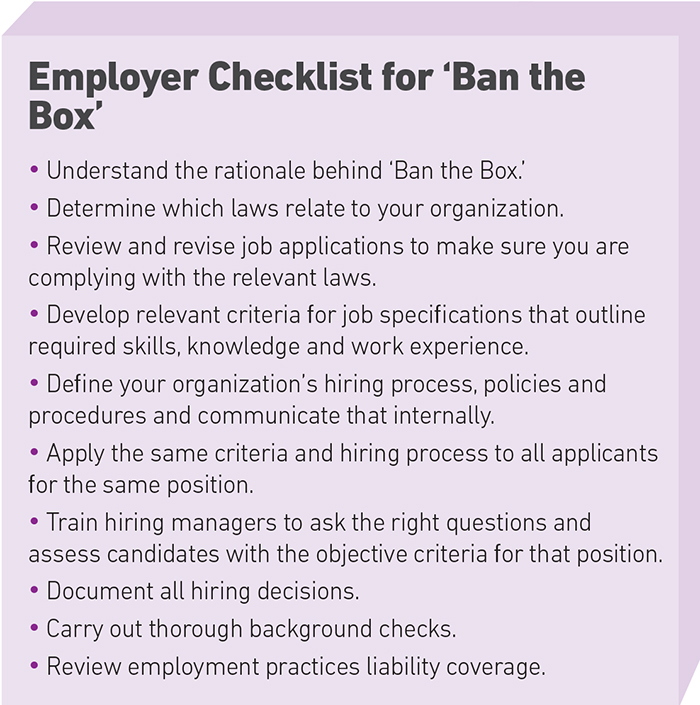Liability Risk
What ‘Ban the Box’ Really Means for Employers

Employers are facing a growing dilemma in the hiring process.
Under ‘Ban the Box’ legislation introduced across 31 states, they are now required to remove the question from their application form that asks candidates if they have been convicted of a crime. Advocates of the law believe it enables organizations to focus on relevant qualifications and gives applicants a fair chance to showcase their talents at the start of the recruitment process.
However, if an employer hires an employee with a conviction who goes on to commit a crime of a similar nature, courts may rule they are liable for that individual’s actions.
The National Federation of Independent Businesses, for one, has argued that ‘Ban the Box’ “unduly suppresses relevant criminal record information” about prospective employees, without which employers can’t protect themselves from loss or ensure the safety of their employees, customers or the public when making hiring decisions.
High-profile cases of ex-offenders committing further crimes at work have only exacerbated the problem. To make matters worse, ‘Ban the Box’ laws vary from state to state, meaning that employers who operate in multiple jurisdictions have to negotiate an even greater legal minefield.
“If an employer hires a candidate with a conviction who then commits a similar crime in the workplace, it could be argued that they were negligent because they hired that person,” said Tom Hams, Aon’s employment practice liability insurance practice leader.
“So the onus is on the employer to ensure that they have done their homework on a candidate’s background.”
“ ‘Ban the Box’ gives an applicant with a conviction the chance to get in front of an employer and sell themselves and to explain the circumstances that resulted in them getting that initial conviction,” said Robert Hale, a partner at Goodwin Procter LLP.
“It also gives the employer the opportunity to consider their application in the wider context, taking into account the positive qualities they may bring rather than being influenced solely by their conviction.”
‘Ban the Box’ Movement
Laura Kerekes, chief knowledge officer at ThinkHR, said ‘Ban the Box,’ which was first deployed in the public sector several years ago, has gained momentum in private industry in recent years, targeting hiring practices that exclude applicants based on criminal records.
She said the checkbox question asking applicants to indicate whether or not they have been arrested and/or convicted of a felony discourages qualified candidates from applying.
“By removing the checkbox, qualified applicants are given a fairer chance to move further into the selection process before their conviction records are exposed,” she said.
“By encouraging more qualified applicants to apply for open positions by banning the box, hiring managers have a wider applicant pool and, in theory, better candidates, so that jobs can be filled quicker and workplaces benefit from skilled talent given a fair chance in the process.”
However, Kerekes added that recent studies have indicated ‘Ban the Box’ may be causing more harm than good. In one case, she said employers found other reasons to disqualify applicants who might have criminal records by requiring higher education standards than those required for the role.
“Eliminating the box means that once the applicant’s criminal history becomes known late in the hiring process, the employer must take extra care to evaluate and document the reasons for either hiring the applicant or disqualifying them for further consideration,” she said.
“Most employers already understand that rejecting an applicant from further consideration because of a past criminal history could be a legal problem and is just not good HR practice.”
Robert Tice, an attorney with Collins Einhorn Farrell, said employers should consider the nature of the crime committed, how long ago it was and how the individual has responded to redeem themselves.
They should also define the relevant job specifications for the role and train their hiring managers to ask the right questions, he said.
“If the conviction is relevant to the type of employment that individual is going to be required to do, then the employer is entitled to obtain that information,” he said.
Case-by-Case Basis
Hale said the Equal Employment Opportunity Commission states that to disqualify an applicant, their prior conviction should be related to the role and each applicant needs to be considered individually.
Employers are also only allowed to ask candidates about their history dating back no more than seven years under the Fair Credit Reporting Act. They are typically not allowed to ask about arrests either, Hale said.
“Employers have a legal duty to their employees to provide a safe workplace, therefore eliminating background checks for convenience may not be the best course of action.” — Cody Bengtson, staff consultant, Gallagher Human Resources & Compensation Consulting
“Employers should be asking job-related questions at the interview,” he said. “But that shouldn’t preclude them from asking questions about convictions if they are relevant.”
One trap many organizations fall into is adhering to ‘Ban the Box’ but not carrying out a background check on a candidate’s criminal record after the initial application, or not asking them the question at the first interview because they are worried about potential liability, said Cody Bengtson, staff consultant at Gallagher Human Resources & Compensation Consulting.
That is particularly relevant when hiring for sensitive positions such as those involving money handling if it turns out the applicant has been convicted for fraud or theft, or for positions in childcare if the applicant has committed offenses against minors.
“Employers have a legal duty to their employees to provide a safe workplace, therefore eliminating background checks for convenience may not be the best course of action,” Bengtson said.
“If a candidate was previously convicted of assault or battery, the employer has to make a judgment call if the candidate’s background could affect any other employees. It’s a harder decision and employers will have to turn to case law to find their answers.”
Source: ThinkHR
Tightening the Net
Beth Goldberg, chief underwriting officer, financial lines, Starr Companies, said that laws such as California’s Assembly Bill No.1008 take ‘Ban the Box’ a step further, requiring all employers in the state with five or more employees to complete any inquiries into an applicant’s criminal history after a conditional offer.
“If an employer wants to deny an application for a position solely or in part because of conviction history, the company must take a number of steps to be compliant with AB 1008,” she said.
“This is where thorough training comes in for those individuals handling the HR role or company hiring managers to ensure awareness and compliance specifically with the company’s job application, interview guidelines and procedures for criminal background checks.”
Karl Lindegren, a partner at Fisher and Phillips LLP, said employers should work with their brokers to ensure they have the right coverage in place to protect them.
But they also need to understand the limits and employment acts that are excluded to mitigate against negligent hiring claims, he said.
“Talk to your broker or carrier to discuss your needs and to understand what coverage you have, and what is excluded,” he said.
Already Happening in Court
A recent decision by California’s Supreme Court ruled that Liberty Surplus Insurance must pick up the defense costs of Ledesma & Meyer Construction Company after it was sued for negligently hiring a twice-convicted registered sex offender who later raped a 13-year-old girl at a school construction site.
L&M hired Darold Hecht in 2003 as an assistant superintendent assigned to a San Bernardino Unified School District construction site. In 2010, a 13-year-old student sued L&M in State Court alleging Hecht had sexually abused her. The allegations included the negligent hiring, retention and supervision of Hecht.
The student was awarded $3.2 million from L&M, which covered the school district’s legal costs under the contract. Liberty subsequently filed a Federal lawsuit, arguing that it wasn’t obliged to cover the district’s costs as an accident under the policy.
However, the California Supreme Court ruled that Hecht’s actions didn’t preclude potential coverage for L&M.
The court stated: “Absent an applicable exclusion, employers may legitimately expect coverage for such claims under comprehensive general liability insurance policies, just as they do for other claims of negligence.” &












